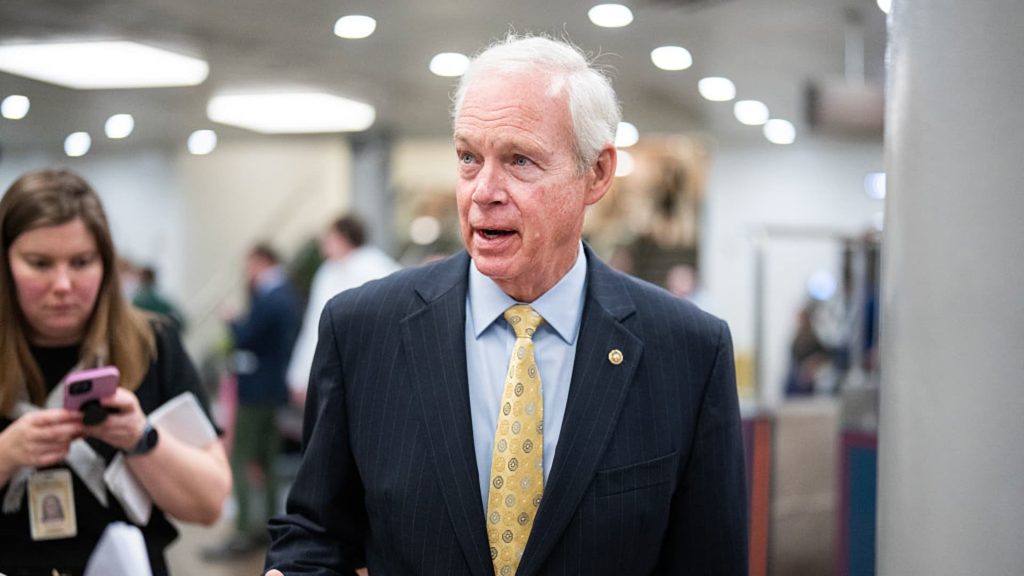In a significant move that could alter the course of recent legislative efforts, Senator Ron Johnson (R-Wis.) has expressed confidence in his ability to rally sufficient Republican support against the House’s proposed domestic policy package. His comments came on Sunday, reflecting deep concerns about the potential financial implications of the bill. As the legislation narrowly made its way through the House last week, fiscal conservatives in the Senate are urging for amendments to ensure spending reductions and deficit control.
| Article Subheadings |
|---|
| 1) Legislative Hurdles Ahead for the House’s Proposal |
| 2) Senator Johnson’s Concerns on Federal Spending |
| 3) Backlash from Fiscal Conservatives |
| 4) The Role of the Congressional Budget Office |
| 5) Looking Forward: The Future of the Bill |
Legislative Hurdles Ahead for the House’s Proposal
Senator Ron Johnson recently highlighted the challenges that the ambitious domestic policy package faces in the Senate. The measure, passed by the House just a week prior, is deemed highly contentious among fiscal conservatives. They view it as a potential catalyst for increasing the federal deficit rather than curtailing it. The discussion centers around the implications of the bill, which Speaker Mike Johnson has dubbed a “big, beautiful bill.” However, Senate Republicans are torn, leading to calls for a thorough review and possible amendments before moving forward.
Senator Johnson’s Concerns on Federal Spending
During a recent appearance on CNN’s ‘State of the Union’, Senator Ron Johnson reiterated his apprehensions regarding federal spending. He believes that the proposed legislation will exacerbate the already troubling issue of budget deficits. According to him, the first priority of the budget reconciliation process should be reducing, not increasing, the deficit. He emphasized that the government needs to revert to spending levels that were in place prior to the pandemic, arguing that the current trajectory will lead to unsustainable fiscal policies.
Backlash from Fiscal Conservatives
Several GOP senators share Ron Johnson‘s sentiments, advocating for a more conservative approach to government spending. Senator Rand Paul (R-Ky.) characterized the spending cuts proposed in the House bill as “wimpy and anemic.” In a recent discussion on Fox News, Paul conceded that he could support the bill if it didn’t contribute to an explosion of the national debt. However, he maintained that the arithmetic simply does not add up, urging his colleagues to reconsider the financial implications of the proposed package.
The Role of the Congressional Budget Office
Adding to the concerns surrounding the bill, a recent analysis from the nonpartisan Congressional Budget Office (CBO) forecasted that the sweeping domestic policy initiative could lead to an increase in the federal deficit by a staggering $3.8 trillion over the next decade. This alarming prediction serves to bolster arguments from fiscal hawks in the Senate. The CBO’s projections underscore the significance of thorough legislative oversight and demand a more cautious approach to government spending in the face of rising national debt.
Looking Forward: The Future of the Bill
As the Senate reviews the domestic policy package, the potential for modifications remains a focal point of discussion. Senator Ron Johnson seems poised to mobilize his colleagues, urging a collective stance against the bill unless substantial revisions are made. The tension between the House and Senate GOP members signifies a pivotal moment in U.S. legislative history, where the future trajectory hinges on the compromise between expansive social policy and fiscal responsibility. Observers will be keenly watching how these dynamics unfold as talks progress in the coming days.
| No. | Key Points |
|---|---|
| 1 | Senator Ron Johnson believes he can garner GOP support to stall the House’s proposal. |
| 2 | Concerns have arisen that the House bill may lead to increased federal deficits. |
| 3 | The Congressional Budget Office estimates a potential $3.8 trillion increase in the deficit over the next decade. |
| 4 | Fiscal conservatives in the Senate are advocating for amendments to the bill. |
| 5 | The future of the proposed legislation remains uncertain as discussions continue. |
Summary
The ongoing debate surrounding the domestic policy package highlights a critical juncture for U.S. fiscal policy. Senator Ron Johnson‘s efforts to oppose the legislation signify a broader concern among fiscal conservatives about the implications of increased federal spending. As discussions unfold, the involvement of the Congressional Budget Office and dissent from key GOP figures may reshape the narrative and direction of U.S. legislative priorities.
Frequently Asked Questions
Question: What are the main concerns about the House’s domestic policy package?
The primary concerns revolve around potential increases in the federal deficit and unsustainable government spending, as outlined by fiscal conservatives like Senator Ron Johnson.
Question: How does the Congressional Budget Office’s analysis affect the legislative process?
The Congressional Budget Office‘s analysis serves as a critical benchmark for lawmakers, indicating the potential financial implications of legislative proposals and influencing the direction of discussions.
Question: What might be the next steps for the House’s proposal?
The next steps involve Senate discussions, where GOP members are likely to propose amendments aimed at fiscal responsibility before any final vote on the legislation.
